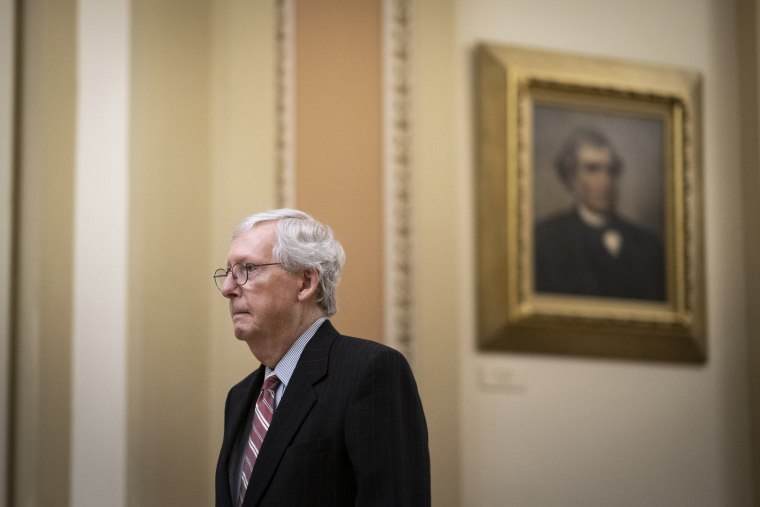Senate Minority Leader Mitch McConnell has never been timid about launching legislative hostage strategies. Indeed, for the Kentucky Republican, the word isn’t even especially inflammatory: McConnell has literally referenced “hostages“ when describing his tactics.
That said, the Senate GOP leader’s newest threat is brazen, even by McConnell’s standards. Roll Call reported:
Republicans won’t back compromise legislation to boost domestic semiconductor manufacturing and U.S. competitiveness with China if Democrats continue to negotiate a partisan budget package that can pass without GOP support, Senate Minority Leader Mitch McConnell said Thursday.
“Let me be perfectly clear: there will be no bipartisan USICA as long as Democrats are pursuing a partisan reconciliation bill,” the Kentucky Republican declared via Twitter.
At this point, I suspect some of you are asking, “What in the world is USICA?” so let’s review how we arrived at this point.
As legislative fights go, this one hasn’t exactly been front-page news, but lawmakers — from both chambers and both parties — have spent much of the last year on an ambitious bill to bolster American competitiveness and counter China, in large part by addressing domestic semiconductor shortages.
The point of the measure — the “United States Innovation and Competition Act” (USICA), though it’s gone by a few different names — is to make Americans less dependent on foreign manufacturing, especially in high tech. Some have even characterized this as a national security issue. It’s how this became a rare effort that’s intended to address a concern Democrats and Republicans take seriously.
It’s why the House and Senate both passed versions of the bill, sending the issue to a conference committee that began work in April on merging the competing measures into one final package. Most Capitol Hill observers agreed that USICA was likely to pass before the fall elections.
That is, until yesterday.
McConnell’s unexpected tweet was effectively a shot across the bow: The Senate Republican leader is prepared to throw away a year’s worth of work, derailing a bill his own party takes seriously, unless Democrats abandon their budget reconciliation bill.
And at this point, some of you are now also asking, “There’s a Democratic budget reconciliation bill?” The short answer is no, but after the Build Back Better effort was left for dead months ago, there’s been significant progress of late on a new bill that would focus on, among other things, lowering prescription drug costs.
Because the bill would be passed through the budget reconciliation process, it could not be filibustered, and therefore does not need any GOP votes.
For the better part of a year, McConnell worked from the assumption that Democrats would fight amongst themselves and never actually agree on a reconciliation package. For a long while, that belief appeared sound. But now that Democrats appear to be closing in on a possible deal, the Kentucky Republican is getting nervous — to the point that he’s scrambling to kill the agreement with the only tactic available to him:
A hostage strategy.
Democrats were not impressed. White House Press Secretary Karine Jean-Pierre issued a written statement yesterday afternoon that read:
"The Republican Senate leader is holding hostage a bipartisan package to strengthen American competitiveness versus China, that would yield hundreds of thousands of manufacturing jobs in places like Southern Ohio, Idaho, and other states around the country. It would lower the cost of countless products, and end our reliance on imports. Why? To protect the ability of big pharmaceutical companies to price gouge. Senate Republicans are literally choosing to help China out compete the U.S. in order to protect big drug companies. This takes loyalty to special interests over working Americans to a new and shocking height. We are not going to back down in the face of this outrageous threat."
House Speaker Nancy Pelosi’s office similarly marveled at McConnell’s willingness to “side with the Chinese Communist Party against American workers and American industry.”
At face value, the GOP leader has a tough case to make: His current position is that he’d rather help our foreign competitors than allow Democrats to help consumers afford medications. It’s a tough sell at any time, but it’s especially tough during an election season.
What’s less clear is what happens now. Will Democrats cave? Will McConnell? Will his Republican members stand behind his latest hostage standoff? How will Sen. Joe Manchin respond to McConnell’s latest gambit? Can USICA be folded into the reconciliation bill, making the hostage strategy irrelevant?
Watch this space.
Related:

